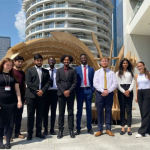Continuing to support young people for the future of work
Written by Kessa Amoo (Education Team/ELBA) and Maria Tonchievici (Mentoring Works/Big Alliance)
As we begin a new academic year in the Education Team at ELBA, we pivot our focus to ensure young people who are feeling demotivated after a year of Zoom fatigue, lockdown learning and gaps in corporate engagement and careers activities are feeling as enthused and confident for the future as they possibly can be. After a turbulent year, we understand that young people need to have those key interactions with employers now more than ever.
We understand that it is impossible for many schools to teach students and provide students with extracurricular activities, as well as having a stable careers programme and often the education system does not account for equipping students with the necessary skills that they need to enter the workforce, neither essential skills they will need throughout their lives. 44% of employers feel that young people leaving school, college and university are not ‘work ready’ which can be detrimental to them in the hiring process . It becomes incredibly cyclical for young people to essentially need experience in a corporate setting to be considered ‘ready’, but many leaving school, college or university may have had access to this experience, leaving a massive gap in the workforce. Similarly, as many as 1 in 4 young people report that they do not feel adequately prepared by their education for the world of work, which can leave students feeling alienated and demotivated by the prospect of looking for, entering work or thinking about careers and forward-planning. There is a question about the usefulness of school in preparing young people for the future of work, with 56% having an idea of their future career path, however not feeling supported by their education system, and 44% fearing that the skills they possess will not be in demand for the future .
Although many firms have CSR teams or committees dedicated to working with young people and supporting corporate engagement, there are often real challenges associated with schools and colleges being able to embed this area of support into the curriculum, which includes funding and adequate resources. In light of the above, it is incredibly important to continue the conversation of helping students to overcome the anxieties that the corporate world poses, and keep them well-informed and feeling confident about the future. Covid-19 has had a massive economic impact with young people facing disrupted education, a competitive labour market, unemployment figures rising and skills gaps in those applying for jobs, it is easy for young people to be anxious about the future. We must educate ourselves on the changing labour market so that we can do the most we possibly can to prepare our young people for the future.
In the Education Team at ELBA, our work is largely centred around introducing students to the corporate world and equipping them with the skills necessary to thrive in the future as well as raise their aspirations and broaden horizons about the roles and opportunities available to them. The Education Works team supports schools by working with them to achieve Gatsby Benchmarks 5 and 6: Interactions with employers and employees and Experiences of workplaces. We focus on delivering employability sessions with business volunteers to students such as:
● Career Talks
● Career Insight sessions
● Mock interviews
● Enterprise Days
We also work with colleges and universities to support their students to make well-informed career choices, which includes expanding their knowledge of a range of sectors, sharing apprenticeship and internship information and providing opportunities to strengthen and develop their skills. Last year, the team supported 2823 students virtually and engaged 1356 volunteers, which was fantastic to see.
On reflection, the Mentoring Works programme across ELBA and the BIG Alliance also had tremendous success last year in really developing young people for the future. The academic year programme usually consists of 9 months of mentoring for Year 10 students, and 5 months for Sixth Form students, where students are matched to a business volunteer in the City/Canary Wharf for the duration of their mentoring relationship. The mentoring relationship gives students the chance to develop their skills, network and equip them with the necessary tools to start thinking about their careers and guide students to explore options and develop the skills, competencies and knowledge they will need for future, education, training and employment. Part of the successes of last year included embedding the Skills Builder framework into the Mentor Resource Pack, training and mentoring sessions. The Skills Builder framework is widely recognised and is currently used by 500+ schools and colleges, 120+ employers and 90+ impact organisations. It provides a universal language for students to use to talk about their skillset, as well as become familiar with how employers think and talk about essential skills. By embedding this into the Mentoring Works programme and transitioning away from the generalisation of ‘soft skills’ and being more specific about the skills students possess, we are able to contribute to building the whole individual. Students can look at the eight sets of skills and competencies attributed to each skill and not only tap into different skills but also identify weaker areas and build upon and strengthen those.
Encouragingly, throughout the tumultuous academic year of 2020-2021, the Mentoring Works programme bore amazing results. In total in 2020-2021 we worked with 293 students and 248 mentors in comparison to 413 students and 254 mentors we worked with in 2019-2020 which came from 19 schools, sixth forms and colleges; and the interest has been such that we have had 4 new companies join the programme this year and a further 2 companies joining the programme next year, one of which came through a mentor and demonstrates the appetite for mentoring and supporting our young people. The Mentoring Works team had the incredible challenge of converting a face to face mentoring programme to a telephone mentoring scheme through the likes of covid-19 and ensuring that students were appropriately supported throughout the programme despite the alienating experience of not being able to physically meet their mentors. Nevertheless, we have received some incredible feedback from both mentors and mentees alike:
“It was my first time participating in this programme and because of the pandemic, it was weird at first, all our conversation took place over the phone, so I guess it took time for each other to understand each other, to open each other up. But over time I learnt that my mentee is very intelligent and at her age she impressed me, surprised me. Just thinking back to when I was 14 and the school was different. She impressed me with her plan about own career development which is very different from my career in banking. I learnt quite a lot from her. I taught her about personal finance and hopefully she took away something useful from that.”
– Mentor
“I have learnt lots from my mentoring experience and it really helped me improve my social skills because when I first started I was really nervous and shy, but as time went on, it got easier to talk to another person about what I want to do and it really made me reflect on all the options I have, and that made it so much easier. I want to say thank you to my mentor and I really appreciate her for helping me.”
– Mentee
Despite the challenging transition into a telephone mentoring programme last year, we have recorded some amazing statistics that have left the team feeling incredibly enthused and solidifies the usefulness of mentoring to students regardless of the delivery method. Of the many amazing statistics we have collected, school coordinators have reported that:
- they have seen an improvement in all Skills Builder skills and competencies among students who participated in the mentoring programme this year
In addition to that, according to the student feedback:
- 100% of students have improved their speaking skills
- 100% of students have improved their confidence
- 100% of students have improved their business awareness
The power of a role model who can activate excitement and hope within a student unsure about their career path and support, nurture and challenge students throughout a mentoring relationship should not be underestimated. There is real value for students in relationship building and networking, using the mentors as a sounding board to bounce ideas off and understanding more about corporate culture and it is a pleasure to see how many students we have had a positive impact on this year through the Mentoring Works programme.
The work that we do in the Education Team is incredibly important, useful and relevant albeit very different in academic year 20/21. We understand that the impact of virtual activity is simply incomparable to face to face activity but, regardless of the means we need to use to deliver impact to students in an ever-changing world of Covid-19, we will continue to keep young people and education at the forefront of what we do and continue to support them with the crucial employability skills that are needed for all areas of life and the world of work. We must remember that the future of work means investing in our young people, upskilling, developing, broadening horizons and nurturing future talent in order to cultivate future leaders. It is crucial to keep momentum in this conversation and continue to bridge the gap between local communities, schools and businesses to enable students to have those vital conversations and interactions with employers, mentoring and skills sessions that may well change their perspective on the future of the world of work and spark some hope for the future generation.
To stay up to date with the latest news, opportunities and success stories, please sign up to receive our monthly newsletter, here.


